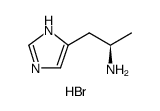868698-49-1
| Name | 1H-Imidazole-5-ethanamine, α-methyl-, dihydrobromide, (αR) |
|---|---|
| Synonyms | (R)-(-)-Alpha-Methylhistamine dihydrobromide |
| Description | (R)-(-)-α-Methylhistamine dihydrobromide is a potent and selective H3 histamine receptor agonist with a Kd of 50.3 nM[1][2]. (R)-(-)-α-Methylhistamine dihydrobromide can cross the blood-brain barrier, and can enhance memory retention, attenuates memory impairment in rats[3][4][5]. |
|---|---|
| Related Catalog | |
| Target |
H3 Receptor:50.3 nM (Kd) |
| In Vitro | (R)-(-)-α-Methylhistamine dihydrobromide is an H3-agonist that is > 10 times as potent as histamine (HA). Its selectivity toward H3-receptors is > 1,000 times as high as that of HA. (R)-(-)-α-Methylhistamine dihydrobromide has only weak affinities for H1 and H2 receptor with a pKi=4.8 and < 3.5, repectively. (R)-(-)-α-Methylhistamine dihydrobromide displays >200-fold selectivity over H4 receptors[1][2][3]. |
| In Vivo | Pretreatment with (R)-(-)-α-Methylhistamine dihydrobromide (RAMH; 10 mg/kg; i.p.; 60 min before training) reverses propofol‐induced (25 mg/kg; i.p.; 30 min before training) memory retention[5]. (R)-alpha-Methylhistamine dihydrochloride (6.3 mg/kg; i.p.) significantly decreases the steady-state t-MH level in the mouse brain, whereas these compounds produced no significant changes in the HA level[3]. Animal Model: Male Sprague‐Dawley rats (10-12 week)[3] Dosage: 10 mg/kg Administration: IP; 60 min before training Result: Reversed propofol‐induced memory retention. |
| References |
| Molecular Formula | C6H13Br2N3 |
|---|---|
| Molecular Weight | 206.08400 |
| Exact Mass | 205.02100 |
| PSA | 54.70000 |
| LogP | 1.95780 |
